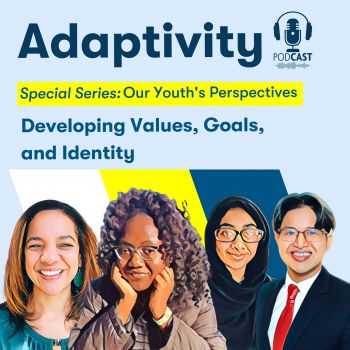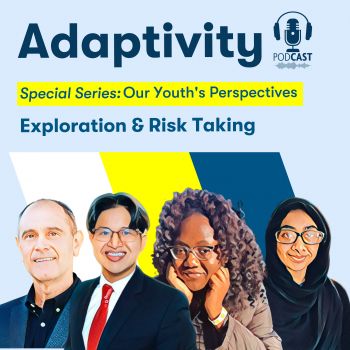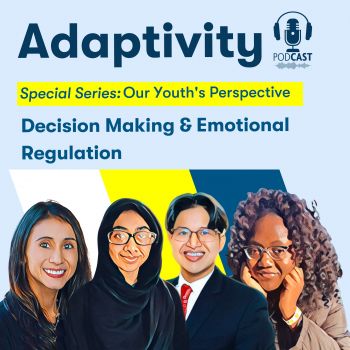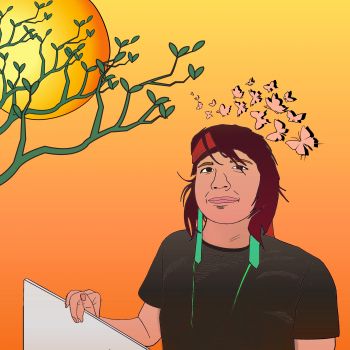Ron Dahl In our adolescent journeys as we are discovering more independently, who we are, support from our parents and other caregivers still matters (often tremendously)…even as we get closer to adulthood ourselves.
Talya Soffer With my grandparents, you know, I learned so much from them, and I feel like I can take back like, so many different values that they grew up with that they’ve taught me, and then I can apply it to my life right now
Ron Dahl Not just moms and dads, but extended family and other caregivers can also provide guidance, support, and affection that remains critical to our wellbeing as we mature.
Dallas Tanner I was raised by a single mom–my mom had me when she was 19, turning 20, and due to that, I was raised a lot by my grand-mommy and my great grandma and my uncles. So I had a very big village growing up.
Ron Dahl And although warmth and support are important for all young people, the kind of parenting an adolescent needs can change depending on other factors like culture, personality, or neighborhood safety.
Kobe Wood I was born in Chicago, and so it was very–it’s much more dangerous. So my parents had to be more restrict with how they would raise me, making sure that me and my sister were safe.
*****
Ron Dahl I’m Ron Dahl, founding director of the Center for the Developing Adolescent, and this is Adaptivity, where we explore the science of adolescence, untangling misconceptions about the years between childhood and adulthood.
We explore new insights into the rapid cognitive, emotional, and social changes that are happening during these years. And how the developing adolescent brain is primed to promote healthy and adaptive learning.
This is the second episode of a three-part series called “Our Youth’s Perspective,” brought to you by members of the Center’s Youth Scientific Council on Adolescence.
Throughout our adolescent years, we seek more agency–and greater autonomy from adult control over our lives. We typically take on more independent roles and responsibilities, make more of our own decisions, and spend more time away from our families.
Yet parents and other caregivers still matter a great deal during these years. In fact, support from caring adults in our lives is essential as we navigate experiences and challenges that build the autonomy and resilience we need to thrive as adults. For example, even as we seek independence, we want our parents and other adults that we respect, to notice and admire what we do. And in some precarious moments of adolescent uncertainty parental support can have a powerful impact.
“Good” parenting will look different in different contexts, different cultures, and for different young people at different ages, but research is clear that our parents and other adult caregivers remain critical to our well-being. The art of being supportive and helpful, but not overly controlling or intrusive, can create parenting challenges.
And now, let’s hear from members of our Youth Scientific Council on Adolescence as they share their insights about parenting styles.
*****
Kobe Wood Wherever you are. Good morning, good afternoon and good evening. I’m your host, Kobe Wood, joined by Talya Soffer and Dallas Tanner.
Talya Soffer Hi, I’m Talya.
Dallas Tanner Hey. I’m Dallas.
Kobe Wood In this episode, we’re discussing different parenting styles and how they might influence adolescence and change over time. I think it’s safe to assume we were all raised differently. Like you, Talya, you told us you’re an adoptee, and since I haven’t experienced this, I’m curious as to how this scenario has affected how you were raised. Talya, can you talk a bit more about this experience? Yeah.
Talya Soffer So I was adopted from China at the age of a little less than 1. So I’ve grown up here in America for basically my whole life. And so my mom is a single mom and I’m her first and only child. So it resulted in her kind of giving me just things that I want. And I could just be a brat. I could demand for things and she would give them to me. I could talk back to her and I would get away with it. And, you know, like, she just wanted to ensure that I had a very loving and caring childhood. And she kind of just ended up letting me take the reins, if anything.
She had to work a lot. And so my grandparents played a really big part in helping her out and raising me. And so my grandparents, them being older, they raised, they were raised in a time where, you know, like you could hit children at school and talking back to elders was not allowed. My behavior to them was super foreign. And so whenever I would argue with them, they just didn’t really know how to react. They would argue back with me, but they just thought that I was playing around. But I was serious. Like I was seriously talking back to them. They entertained me with that and so, so and so, but, um, they, they gave me a lot of love growing up, though, through actions rather than words, like, they weren’t the ones to always be like, I love you. They would show it to me through cooking, making sure that I wasn’t getting sick and I was eating enough.
And I feel like that is such a special thing about grandparents. Like, they really just– they do more than like, than they say. I feel like they show their love through action rather than words. Sometimes, you know, that’s not every family. But I’ve just noticed that. And, um, just I think overall my childhood has been, was a really loving and just happy childhood for me. So I’m really lucky.
Dallas Tanner Um, well, thank you for sharing that with us. I think that’s beautiful, you being able to talk about and tell us your story about you being adopted. I relate with you when it comes to the single mom. I was raised by a single mom. Um, a little difference is I did have a very young mom. My mom had me when she was 19, turning 20, and due to that, I was raised a lot by my grandmommy and my great grandma and my uncles. So I had a very big village growing up. So. And we’re not the type to be like, oh, I love you. Like we’re the type to more be like, “Girl, get out my face.” Yeah, it’s a thing everybody knows.
But with my, all of my younger little siblings, it was very hard because being the oldest, you kind of just had to figure it out for yourself. Because my mom, being a single mom, she was trying to make sure–she was young too, trying to figure out who she was, while also trying to manage how to be there for her children. So when it comes to like having a whole bunch of type of judgment or like a sense of order, in my personal experience I had figured out by myself, which I feel was good because it let me have like a little bit of independence, but also like with how your grandparents were and how your mom had like they kind of steered you a certain way. I just, like, I empathize and I’m like, oh, I want that. What about you, Kobe?
Kobe Wood I mean, I guess I also empathize with both of you as well. Like, I understand, like having nurturing grandparents and parents who, you know, don’t always, like, necessarily say, I love you, but show it, which I think is, you know, more important, they say, um, show, don’t tell. But again, also with you, Dallas, like I also grew up with siblings. So I know about those, I guess, those different dynamics.
However, I grew up in different states and so, like, that would also influence a lot of the ways that I would grow up. Like I was born in Chicago, and so it was very–t’s much more dangerous. So my parents had to be more strict with how they would raise me, making sure that me and my sister were safe and that we didn’t get out of line because it can end up putting either me or both of us in danger. But moving to Hawaii, it was a lot more peaceful. And, you know, we didn’t necessarily have to lock doors. And I could be out past 6 o’clock, 6 p.m. without, you know, having to worry about my life necessarily being in immediate danger.
But then later on, moving to California was a good balance of a mix of those environments where I was still able to be my own person as I was growing up, which I think is important as an adolescent. But I was still also, you know, my parents will pull back the reins whenever I would get out of line just to still make sure that, like, you know, I’m not invincible. Like something could happen to me if I’m not careful. So I think that was very important. Yeah.
Talya Soffer Definitely. Yeah.
Kobe Wood But I wanted to ask you, Talya. Um, do you think that the different styles that you experience were imperative to how you were raised, or like, the way your mother versus your grandparents, like, shaped you?
Talya Soffer Yeah, definitely. And I would say that the style has kind of changed as I grew older, um, because I matured and I got out of that childish, bratty phase. And so I just looked back on it and I realized, like the treatment I gave my mom and my grandparents, they didn’t deserve that. They didn’t deserve to be yelled at. But that was just me being a kid, and I grew out of that. So I, as I got into like my teen years, I wanted more independence. And in order to get that, I had to gain trust, especially from my mom, because she’s protective and I’m her only kid. So of course she’s going to be a little bit extra firm.
But, like, as I’ve gotten older, I’ve noticed that my communication with my mom has gotten really good. Like, we kind of act more like almost friends in a way. Like, of course she’s still my mom at the end of the day. But we talk about so many different types of things. We can talk about anything. And she, like, we just have a lot of trust. And she knows that, like, I wouldn’t get myself into trouble and that she can let me kind of have a little bit more control as I’m getting older.
But also she’s always there to keep me in check if I ever go off the rails. But that’s like almost never.
Um, and then with my grandparents, you know, growing up and seeing them get older, it, like, I no longer wanted to fight with them because they couldn’t fight with me anymore or like, yell or whatever it was. So like, I in turn wanted to give back what they gave me when I was a kid. So I would start to cook for them. I would start to clean for them. I would just go out of my way to do more things for them, because it was really hard to see them, like, get older and also get sick, and it was hard when they passed away as well. But I learned so much from them, and I feel like I can take back, like, so many different values that they grew up with that they’ve taught me, and then I can apply it to my life right now.
Kobe Wood Yeah. That’s real. I mean, I feel very comfortable with my parents and like, I wouldn’t trade them for anything, like even the good and the bad experience. I think they were both important to raising not only me, but also my sister. However, after listening to these stories, I am curious as to what these parenting styles might mean and the deeper psychological meanings behind these events.
*****
Dallas Tanner Well, Kobe and Talya, I have a treat for you. Today we’ve brought in a very special guest, Dr. Leslie Leve, here to explain about parenting styles. She’s coming to us all the way from the University of Oregon. And I was wondering if you could please introduce yourself and give us a little insight on what you study.
Dallas Tanner Please introduce yourself and tell us a little bit about what you study.
Leslie Leve I’d be happy to! Thanks so much, Dallas. Uh, as you said, I’m Leslie Leve. I am the Laurie Lokey Chair in Education at the University of Oregon, and I teach in our prevention science and counseling psychology programs at U of O. And broadly, I study child and family development, really from birth to through adolescence all the way to adulthood and the ways that families, communities, and schools can impact our development as we grow from children to adolescents to adults. And some of that includes families involved in service systems such as the adoption system, foster care, juvenile justice.
Dallas Tanner So, There are differences in the style of parenting even just between the three of us–the three of us being myself, Talya, Kobe–and I know from talking to my friends that they have parents who are a little stricter or even more relaxed than in my family. I was wondering if you can give us a general overview of the main parenting styles that exist and maybe share what parenting style you experienced growing up?
Leslie Leve Yeah, I’d be happy to. You know, it’s interesting because the field has kind of changed a little bit. Historically, we really thought of parenting on these two dimensions. Parental warmth, so being warm versus kind of hostile or cold, and parental control. So parents who are very strict, restrictive, controlling, punitive versus very permissive. And then you kind of between these two dimensions of warmth and control. You had parents who might be um, high on warmth and low in control, so very warm. And we would think of them as permissive or laissez faire. And then in the middle, you’d have parents who might be high on warmth and high on control, and those were called authoritative parents. And then you’d have authoritarian parents who might be lower on warmth but high on control, so maybe more strict without kind of that warm element. And, you know, 50 or more years ago, people thought that authoritative parenting was really that that middle approach was the right way to go.
But then the research really started to show that context mattered. So it’s it’s it’s not that one type is better than the other, that it really is going to depend on, what the surroundings are, what the context is, what the adolescence is experiencing,
And then I would say even more recently, the last, you know, couple decades, it’s it’s we’ve really started to understand that it’s not just about parental warmth and parental control, but there are other dimensions that are really essential. So things like problem solving, how well, how effective are parents at communicating with their adolescent when there’s, uh, a situation that needs discussion or problem solving, uh, monitoring and supervision, which is it’s an element of this control, but it really goes beyond their sort of how much knowledge do parents have about their adolescent’s friends? Do they know where their adolescents are hanging out? What are they doing after school?
And I would say the most important one that we really focus on now is this kind of consistency, predictability, and clear expectations, which is another dimension. So the more that parents, uh, can be predictable essentially, so that a youth knows when they do something that their parent is going to respond in a certain way, that can be really helpful to promote adolescent development.
Dallas Tanner Thank you for that. I was wondering if you could tell me a little bit about what kind of parenting style you had while growing up.
Leslie Leve Thanks for that question. You know, I, I feel pretty privileged that I grew up in a context, a neighborhood that was small and safe. Um, and but at the same time, I would have described my parents as overly strict. I felt like I had a strict curfew. It was early on school nights, a little bit later on weekends. I wasn’t allowed to go to other friends’ houses. If my parents knew that their parents weren’t going to be at home, or if my parents didn’t know them. I had to use my own babysitting money to buy clothes. We were a single family car, so I had to get myself everywhere.
And I at the time I thought that I, you know, I wanted a quote permissive parent. Right? I wanted the parent who was warm and, but I could go out and do whatever I wanted. Um, but I would say, looking back now, in retrospect and what I learned about the science of parenting and then also having children of my own, I realized that really what I grew up with was parents who were very predictable and consistent. I knew exactly the consequence if I came home after curfew. Um, but there was a warmth there. I knew that if something awful was happening in my life, that there was a safety net there, there was a parent I could talk to, who would help me through it.
Dallas Tanner Thank you for giving me some insight on what your childhood was like. I think honestly that feeling of “Oh, I want the warmer parent, the permissive parent,” rather than having the rules and the stricter parent is culturally just an adolescent, teenager thing.
But I did have a question though: is there a parenting style that research shows works best with adolescent brain development? An example I could bring up was one of my partners–Kobe’s–his parents had to navigate keeping him safe in Chicago, so he didn’t much have that free-reign, however, that changed when they moved to Hawaii.
Leslie Leve Yeah, that’s a fantastic question. And the research is really showing that kind of just coming back to how the context matters, that what is important for adolescent development and helping them really develop to their full potential is going to vary depending on what context the youth is living in.
So I’ll give you kind of one example here of a study that just came out that was focused specifically on adolescents, youth who were living in neighborhoods that had more concentrated disadvantage and were more dangerous neighborhoods. And, you know, overall, we know that that can be stressful. And some of those contexts can be associated with more mental health challenges for teens and adolescents.
They did some neuroimaging. They scanned their brains and looked at what was going on in the youth’s brains. And what they started to understand is that there’s parts of the brain that kind of respond to threat, like the amygdala region that was more activated in contexts that were, you know, more dangerous. And that, as you can imagine, is for good reason. Right? If we’re walking into, uh, a situation where we could get hurt or attacked, we want ourselves to be prepared in a different way for that than if we’re, uh, strolling in a park in a very safe neighborhood by ourselves.
So, um, what that research showed, just coming back to the parenting piece of that is that when in those contexts, when when an adolescent had, you know, strong, positive parenting, even when those youth were exposed to the more dangerous neighborhoods, that nurturing parenting really broke the link between the part of the brain, the amygdala reactivity, and youth’s exposure to violence. So it was showing that, yeah, some of our contexts can affect our development as adolescents. And if we have parents who are providing this positive, consistent, nurturing parenting that can disrupt that and kind of override the effects of a dangerous or violent neighborhood.
Dallas Tanner Yeah, thank you. I was wondering what would you say, or what can you say, about people trying to raise their kids uh where safety would be a bigger concern? How would you recommend managing trying to keep a balance between keeping their child safe and also having that warmness?
Leslie Leve That’s a great question. I think some of the examples you gave from your friend are spot on. Right. You want a caregiving, a parent situation where maybe it is more strict, like you need parents to be helping the youth not go into dangerous situations. Right? Keep them safe. And at the same time, when you’re in the home, you need to know that there’s that warmth, that person you can depend on.
But again, I would say overall it’s that consistency so that the, the adolescent knows, um, what to expect from their parent, what to expect from their environment if they do go out into the neighborhood, that one at a time when they’re not supposed to, or if they do have a something unfortunate happen to them at school, that they know that they can go to their parent for a conversation about that, and that parent will be there consistently and be supportive.
Dallas Tanner Yeah, thank you so much for that. So, consistency: Both myself and another partner of ours, Talya, were raised by single moms, and our extended families played a big role in that. Are there any considerations when it comes to single parents and being parented by a group of people?
Leslie Leve That’s also an excellent question. I think what the science tells us there, what the research tells us is it’s not so much the number of parents, or even the amount of time a parent is spending with their child or adolescent. It’s really the quality of that relationship and the quality of interaction that the two of them have, or the youth and multiple caregivers, extended family caregivers.
That’s of course, not to discount the impact that it’s going to be financially more challenging if you have one person providing the income from the family versus two or, or an extended family support. But what the science is telling us is that it’s that quality, the warmth, the consistency, uh, the supervision that whomever the caregivers are, are providing to the adolescent that really matters.
Dallas Tanner Hmm. And do you think the difference between the consistency in the single parenting style that the single mother might be giving and the environment, like, I was raised by my grand-mommy, and my great-grandma and my uncle, so obviously, they had a lot of different ways to go about that. I know Talya was raised by her grandparents, too. And she said their parenting styles were very different. I just wonder if you could give us any insight on that?
Leslie Leve That’s a great way to think about that, because you’re just, you’re layering in not only the consistency of a person, right, but the consistency between caregivers who may or may not be living in the same home, but are providing care for an adolescent. So, um, both elements are essential.
But I think what is the research would show that’s more important is kind of that within person consistency so that, you know, if you stay out past curfew and you’re at your grandmother’s house, you know that what the consequence is going to be versus if you do that at your at your aunt’s house, the outcome might be a little different.
So having that clear knowledge for adolescents about okay, when I do this, x is going to happen. And and but that’s going to be the same thing no matter which household I’m in. That’s what makes a bigger difference.
Dallas Tanner Well, in another episode as part of this series, we explore sibling relationships. I, being the oldest of a very large family, I feel like I’m parented very differently than my younger siblings would be. It does make me wonder: Do parenting styles change depending on sibling order, or is it typical for parents to change styles between every kid?
Leslie Leve The research on that does show that parents do respond, interact with, parent their kids in their household a little bit differently. You can imagine, right, even just from the child’s perspective, first, you’re the only person and the only child that the parents are caregiving for. And now there’s another one. And so you don’t have the same amount of time, but it also can depend on the age difference between the two or how many children there are in the home. There are a lot of, sort of, family context factors that matter.
But some of the research that’s really, um, dived into this a little bit deeper has been studies that have focused on twins, which they’re the same age. But if you if you have studies that have twins who are identical and share basically all 100 percent of their genes, and then twins who are the fraternal twins and only share about half their genes, what some of those studies have shown is that, in the identical twin households, those kids are receiving more similar parenting, more similar levels of warmth and control and hostility, then are the two fraternal twins, the two that are only related 50 percent of their genes.
And so what those kinds of twin studies are telling us is that, um, us as humans we’re essentially evoking or eliciting, uh, interactions with our parents and our caregivers and our surroundings. And so, um, people who have similar biology might be kind of receiving more similar parenting than people who have, uh, different predispositions.
I know growing up and I also grew up with a sibling, sometimes it can feel really unfair, like your sibling gets, you know, to get away with something that you never would have gotten away with as the older child. And it’s complicated to disentangle that from birth order. Like, is it because you’re the oldest and they’re the youngest, or is it because it’s something about their behavior that results in, um, a slightly different kind of parenting being more effective for them as a youth than for you.
Dallas Tanner Definitely, I completely agree with you and I understand how you felt back then. Are you the oldest or the middle child, or…?
Leslie Leve I am the oldest. I have one sister. You know, being a parent, a first time parent, we don’t know what we’re doing. It’s the first time we’ve done it. It’s like you can think of it as a little practice round and, um, you know, then with the second child and third, etcetera, you can, you’re maybe a little bit more confident and comfortable in, uh, being a parent and knowing how to soothe your young child and then later how to talk to your, your child or adolescent in a way that is helpful to them. So I think for both on the youth side and the parenting side, it’s a matter of learning and figuring out, uh, our roles.
Dallas Tanner I was wondering if you could tell us what is important for myself and just all of us to know about parenting specifically during adolescence? Is there a time when parents should consider giving teens more, like, freedom, even if it might be scary to let their babies go? Is there some value in that for us as adolescents having that free reign, that freedom?
Leslie Leve Really important question that intersects with what we know from the developmental science of adolescence in terms of how to help adolescents, how to help anybody, but in particular adolescents, explore their world and establish their identity and take some risks.
So, absolutely, parenting should change across development. And there are times when more, uh, monitoring and supervision are important for development. But there are also times, particularly in adolescence and later adolescence, when it’s essential that teenagers have the opportunity to take some risks and make some mistakes and learn from them, and also know that when they come home and, have the experience in the house, that they’re still part of that family and loved and cared for, and, and given those opportunities. So, you know, if you kind of think of it as if we all lived in a little protective bubble and didn’t ever take risks, we wouldn’t really learn how to succeed. But we also wouldn’t learn how to fail. And that’s an important part of life.
We are always going to encounter challenges, whether it’s in school or in our relationships with our families and outside of our families or in our jobs. Um, we can’t always succeed, and there are going to be times where we’re going to fail and when we’re going to make mistakes, and when parents are able to provide a safe space for their adolescents to explore and take those risks. That’s how we promote identity development and brain development and healthy mental health for youth.
Dallas Tanner Dr. Leslie Leve, I would just like to say thank you for taking the time to talk to us about the science behind it all. And that this conversation was very insightful and amazing and just thank you for your time altogether.
Leslie Leve Well, thank you for your time and your really thoughtful questions. I truly enjoyed speaking with you.
Dallas Tanner Likewise. Now, if you enjoyed listening. Please check out the next episode, where we’ll hear how sibling relationships affect us during adolescence. Uh, I’m gonna pass it off to my friend, Kobe.
Kobe Wood To close it off, we would just like to say “thank you” for taking the time out of your day to listen to this podcast. Hope you enjoyed the different perspectives on parent and child relationships. This has been Kobe Wood.
Talya Soffer Talya Soffer
Dallas Tanner And Dallas Tanner.
*****
Ron Dahl There is no single ‘right way’ to parent an adolescent. Yet the scientific principles to guide these choices are clear. Research into adolescent development shows that warmth, support, and consistency from parents and other caregiving adults remains an essential component of positive development throughout our adolescent years.
Part of the caring can also involve helping them recognize and learn from mistakes and helping them ‘earn’ more independence by demonstrating their improving abilities to make responsible choices.
*****
I’m Ron Dahl, and this has been a special episode of Adaptivity from the Center for the Developing Adolescent.
We’d like to thank Kobe Wood, Dallas Tanner and Talya Soffer from the Center’s Youth Scientific Council on Adolescence for sharing their experience with us.
For more on the developmental science of adolescence and the YSCA, check out our Instagram: @develadolescent.
If you’d like to learn more about the science of adolescence, visit us at adaptivitypodcast.org or share your thoughts through the contact information at our website.
Our podcast is produced at UC Berkeley for the Center for the Developing Adolescent. Our senior producer is Polly Stryker. Our producer is Meghan Lynch Forder. And our engineer is Rob Speight.
A special thanks to Peter Jivotovski at the UCLA Learning Center’s De Neve Studio and to Xochitl Arlene Smola for her facilitation of the YSCA projects.
*****


_350_350_80_c1.jpg)
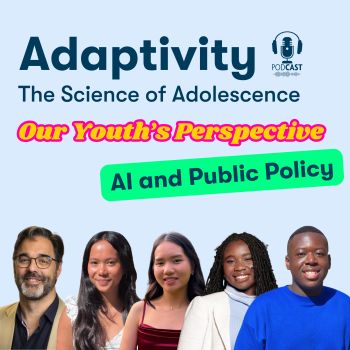
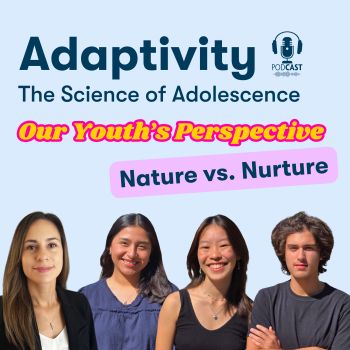
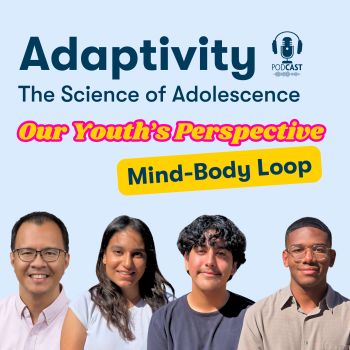
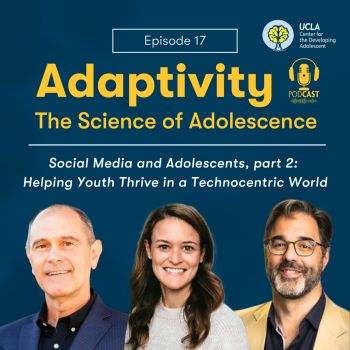
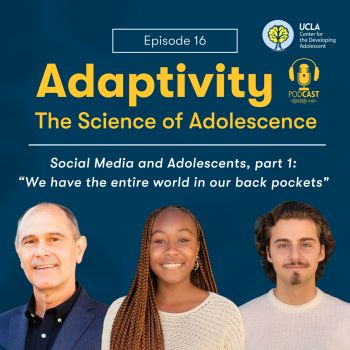
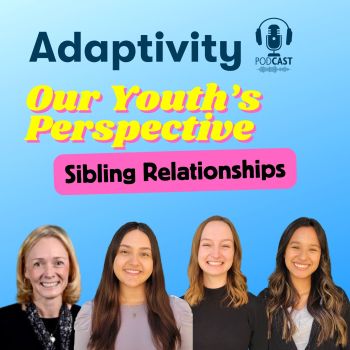
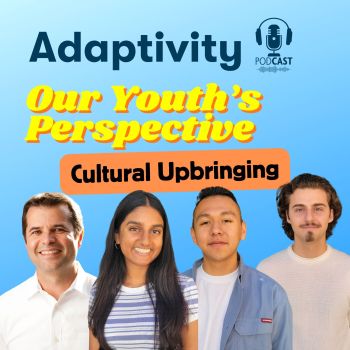
_350_350_80_c1.jpg)

